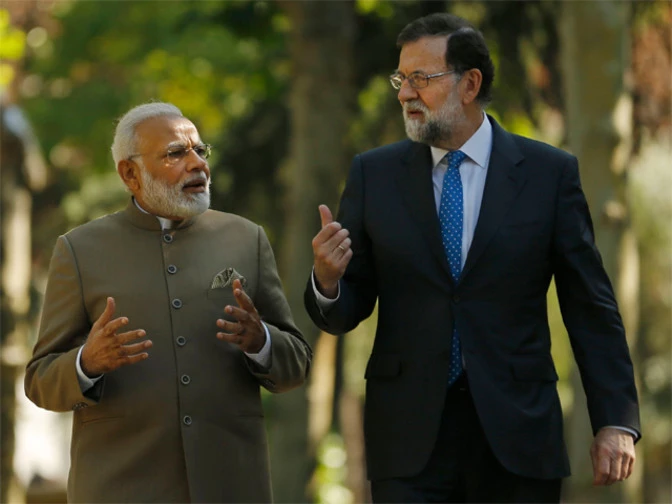
Partner Article
Gustavo de Aristegui calls for more initiatives to foster Indo-Spanish relationship
Gustavo de Aristegui, the former Spanish ambassador to India, calls it a new dawn in the history of Indo-Spanish relations. In June this year, Spain and India signed 7 agreements that will strengthen and expand defense ties. This includes a civil nuclear deal and anti-terror exercises along with a list of addendums around investments and technology.
PM Modi’s Spanish tour was the first high level visit to Spain in almost three decades. This trip was long due, because India and Spain have had a very small array of interaction and agreements in the past. The scope however, is bigger than one can expect. The South Asian and the Iberian countries share much in common, including a BPL rate of 29% and 21% respectively – which ought to give an incentive to both their governments. With co-operation, both can escape the shackles of economic slowdown, especially Spain.
The Spanish Prime Minister, Mariano Rajoy talked about strengthening cyber security and the exchange of law offenders. Indian Prime Minister Narendra Modi promoted India as an investment hub, rife with opportunities. As it stands, the Spanish firms will find a huge range of services, such as renewable energy, health & medical research, agriculture, information technology, nanotechnology, and civil engineering. All of these sectors require a bevy of inputs and resources which the Indian government will be happy to provide to Spanish investors. Consequently, investments from different nations would likely bolster the FDI of India and strengthen the ’Make in India initiative of the Modi government.
Gustavo de Aristegui suggests that India and Spain need more co-operative instances, especially when it comes to battling Islamic radicals, since both nations have suffered terrorist attacks from extremists. The joint statement called for the implementation of United Nations Security Council Resolution 1373. PM Modi was also one of the first world-leaders who condemned the Barcelona attack with vigor. He promised to support and work with Spain to bring the terrorists to justice.
The lack of political and economical accords has not affected the cultural exchange between Spain and India to the slightest. Last month, the first-round table of Sanskrit pushed its desire to share Sanskrit scholars with Spain. The round table was held in three Spanish cities − Valladolid, Madrid, and Tenerife. The Vice Chancellor of Rashtriya Sanskrit Vidyapeetham, Prof V Muralidhara Sharma visited the round table to discuss the impending opportunities that Sanskrit’s richness will bring, when revived. Likewise, his Majesty Felipe VI, the King of Spain, visited India on November 2009. He inaugurated the Cervantes Institute in Delhi, a Spanish-teaching organization that can train students in both elementary and corporate Español. The institute also provides placement services.
Leaving all the morose elements aside, Gustavo de Aristegui reckons that a lot of effort has to be put in the tourism sector. Spanish nationals form the bulk of foreign tourists in India after France and USA, with an average contribution of 5.76% of the total tourists. The Indian tourism sector might grow by 2.5% with a high budgetary allocation and the sheer ‘exotic’ pull of its heritage and cultures.
Spain is experiencing a spike in visits by Indian tourists. Aristegui thanks Bollywood for this development – courtesy a movie based on travels to Spain. Movies featuring La Tomatina and Running of the Bulls have attracted Indians to experience the adventurous and welcoming culture of Spain. The three-fold rise in Indian tourists can be maintained and nurtured even more with special campaigns directed towards the Indian audience, proposes Gustavo de Aristegui.
It’s evident that the canvas is still empty and a beautiful painting can take its place. Indo-Spanish relations are devoid of scars or any kind or any diplomatic chinks. This gives both of the countries a huge opportunity to create a supportive alliance, which should be forged speedily.
For the United Kingdom, a growing partnership between Spain and India is detrimental since India’s growing appetite for tech, investments and industrial requirements would be satiated by another nation. This means lesser jobs for UK, less capital influx and in turn a stagnated growth trajectory. The UK government under Theresa May would do well to focus on the developing strata of India if it wants a progressive, mutually beneficial alliance.
This was posted in Bdaily's Members' News section by Arnav Singh .








 Powering a new wave of regional screen indies
Powering a new wave of regional screen indies
 A new year and a new outlook for property scene
A new year and a new outlook for property scene
 Zero per cent - but maximum brand exposure
Zero per cent - but maximum brand exposure
 We don’t talk about money stress enough
We don’t talk about money stress enough
 A year of resilience, growth and collaboration
A year of resilience, growth and collaboration
 Apprenticeships: Lower standards risk safety
Apprenticeships: Lower standards risk safety
 Keeping it reel: Creating video in an authenticity era
Keeping it reel: Creating video in an authenticity era
 Budget: Creating a more vibrant market economy
Budget: Creating a more vibrant market economy
 Celebrating excellence and community support
Celebrating excellence and community support
 The value of nurturing homegrown innovation
The value of nurturing homegrown innovation
 A dynamic, fair and innovative economy
A dynamic, fair and innovative economy
 Navigating the property investment market
Navigating the property investment market